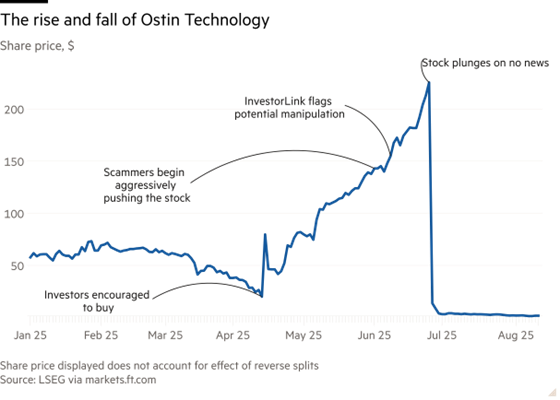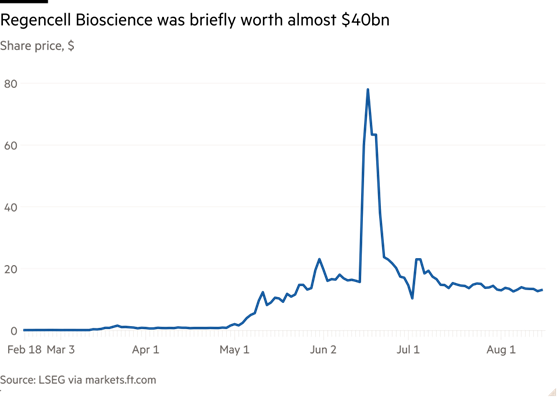This post was originally published on this site
A handful of Nasdaq-listed Chinese companies crashed last month after heavy promotion on social media.
iStock-2194154887
Investors lost billions of dollars in July betting on a handful of small US-listed Chinese stocks that plunged in value shortly after being heavily promoted on social media.
Seven Nasdaq-listed microcap stocks — Concorde International, Ostin Technology, Top KingWin, Skyline Builders, Everbright Digital, Park Ha Biological Technology and Pheton Holdings — all dropped more than 80 per cent over a few trading sessions in recent weeks.
The declines wiped a cumulative $3.7bn off their market value, according to price data analysed by predictive analytics firm InvestorLink. All seven stocks had surged before their sudden sell-offs, having been plugged to investors on WhatsApp groups and social media sites.
Analysts and investors said the moves bore many of the hallmarks of pump and dump scams. There is no suggestion that any of the companies named were involved in the unusual share price moves. None of the seven responded to requests for comment.
Stock pump and dumps — where people with a vested interest artificially inflate a company’s share price before abruptly selling their own holdings — have plagued US markets for decades but were last a major problem during the bull run of 2020 and 2021, when dozens of unprofitable Chinese groups rocketed higher then tumbled shortly after listing.
The FBI said last month it had seen a 300 per cent year-on-year increase in victim complaints “referencing ramp and dump stock fraud”. It added that investors were being targeted on social media by people impersonating “legitimate brokerage firms or well-known stock analysts”.
Many scams are linked to the record number of Chinese companies that went public on US stock exchanges in 2024, a trend that has continued this year with China and Hong Kong-based companies dominating the otherwise sleepy US microcap IPO market.
Victims of the alleged pump and dump scams include first-time traders and a former diplomat, according to correspondence seen by the Financial Times.
Tia Castagno, who runs her own executive coaching business from London, was added to a WhatsApp group after she clicked on an advert on Facebook. She eventually lost all of her savings after being encouraged to invest in Ostin Technology by what she said looked like a legitimate US investment firm.
“There’s a feeling of emptiness in my stomach, and shame. I keep questioning my judgment and remembering how I felt when the rug was pulled from under my feet,” she told the FT.
Ryan Sweetnam, a UK-based lawyer at Cel Solicitors, said he had “more than a hundred clients involved in pump and dumps on Chinese penny stocks instruct me over the last couple of months”.

Analysts say US regulators have been repeatedly warned that certain stocks are being used as vehicles for fraud.
Almost every week for the past seven months, InvestorLink’s founder Matthew Michel has emailed contacts, including the FT, to flag unusual social media activity around certain US-listed microcap stocks.
One large Wall Street trading firm — which also utilises InvestorLink’s platform and asked not to be named — has repeatedly warned the Securities and Exchange Commission and Nasdaq of the potential manipulation of shares in certain companies.
Nasdaq and the SEC declined to comment.
InvestorLink alerted the market, and the FT, to unusual online activity around Pheton in early July, almost three weeks before the company’s shares fell 95 per cent in a single trading session.
One European retail investor, who said they lost a “six-figure” amount on Pheton and asked not to be named, was added to a WhatsApp investment group after clicking on a Facebook advert boasting an endorsement from a well-known US television pundit.
The WhatsApp group of about 40 participants, most with phone numbers from the UK and the US, appeared to be run by a legitimate US broker, which began recommending investments in the healthcare sector and companies working on cancer treatments, the person said.
“They asked if I was AI-bot early on . . . a good ruse. It looked like a kosher operation,” the person added. “I almost fell off my chair [when the stock was dumped], it was a chastening experience.”
The potential manipulation of Ostin’s shares was flagged by InvestorLink on June 9, two weeks before its shares dropped 94 per cent in one day.
Noushin Mirshokraei, who runs a food and drinks company in Italy, said she lost $70,000 after being convinced on a WhatsApp group to buy into Ostin ahead of a partnership the company was supposedly entering into with a large US-listed firm.
“All the information that was given to us on WhatsApp groups was from fake participants,” she said. “The only real people in there were the ones being manipulated.”
A Meta spokesperson said: “We don’t want this type of content on our platforms, which is why we’re continuing to invest in technology to aggressively enforce against scams; provide people with on-platform warnings and tools to protect themselves; and partner with banks, governments, and law enforcement to stop these criminals.”
Michel’s analysis of Ostin’s share price moves also revealed “clusters of co-ordinated activity” on Reddit, with 12 users posting similar promotional content about the stock within a two-hour window.
Geolocation metadata suggests that three of these users were based in Russia and Iran, according to Michel — a trend he said InvestorLink has identified in other pump and dumps, some of which are more extreme than others.

By June 17, shares of Chinese herbal medicine group Regencell Bioscience — which reported a net loss of $4.4mn in 2024 — were up almost 60,000 per cent for the year, giving the company a market value of about $38bn, more than Jefferies and Walgreens combined.
The stock has since fallen 83 per cent. There is no suggestion that Regencell was involved in its share price moves. The company did not respond to a request for comment.
© 2025 The Financial Times Ltd. All rights reserved. Please do not copy and paste FT articles and redistribute by email or post to the web.
